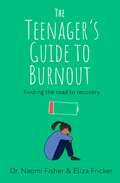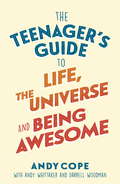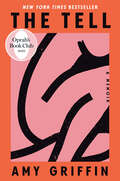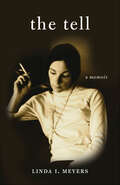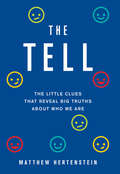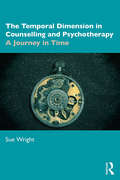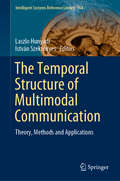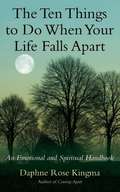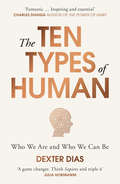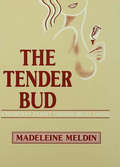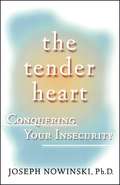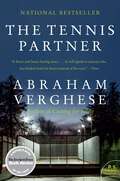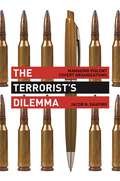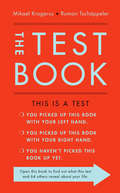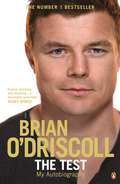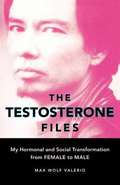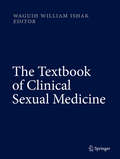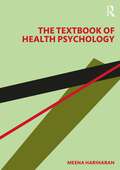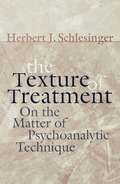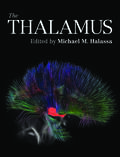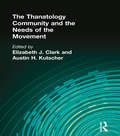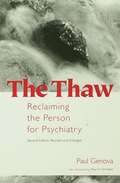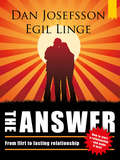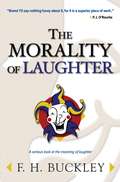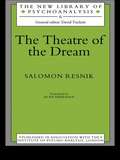- Table View
- List View
The Teenager's Guide to Burnout: Finding the Road to Recovery
by Dr. Naomi Fisher Eliza FrickerAn essential guide for all teenagers experiencing stress and burnoutDoes any of this sound like you? - Lacking in energy and feeling that your life has lost its sparkle- Feeling like you can't ever quite relax- Unable to sleep despite being exhausted all the time- Finding that you don't really enjoy anything anymore, even things you used to love- Feeling that everyone is irritating and no one understands- Finding going to school really hard or not possible at all anymoreThen this book might help. These are signs that you are experiencing burnout − your battery has taken a battering and you are running on empty. Many people think burnout only happens to adults, but it's something lots of teenagers experience too. This book will help you to understand what burnout is, how you got there and what you can do to get back to a life you enjoy. We've written it to help you work out if you might be burnt out, and if so, what you can do about it. It will help you identify some of the ways that you might be getting stuck when you're trying to get better. You'll get some ideas as to what is and isn't helping. And if you decide that you aren't really burnt out but you're heading that way, this book has some ideas to stop it from happening in the future.Co-written by expert clinical psychologist Dr Naomi Fisher, who has helped many teenagers deal with the stresses and pressures of school and life, and by bestselling author and illustrator Eliza Fricker.
The Teenager’s Guide to Life, the Universe and Being Awesome
by Andy CopeCongratulations, you're already awesome. You are the best in the world at being you. The problem is that it's easy to forget!This book, by the authors of the extraordinary bestseller THE ART OF BEING A BRILLIANT TEENAGER, is a reminder that you are awesome and a prompt for bigger and better things. It asks not what you want from life, but what kind of person you want to be, exposing the key to planning for your future - building your best qualities so you can stand out and live a brilliant, energetic, successful life. You are already the best in the world at being you. This book will help you get even better.
The Tell: A Memoir
by Amy Griffin<b>NEW YORK TIMES BESTSELLER</b> OPRAH&’S BOOK CLUB PICK <p> An astonishing memoir that explores how far we will go to protect ourselves, and the healing made possible when we face our secrets and begin to share our stories. <p> “A beautiful account of the journey of courage it takes to face the truth of one’s past.”—Bessel van der Kolk, #1 New York Times bestselling author of The Body Keeps the Score. <p> For decades, Amy ran. Through the dirt roads of Amarillo, Texas, where she grew up; to the campus of the University of Virginia, as a student athlete; on the streets of New York, where she built her adult life; through marriage, motherhood, and a thriving career. To outsiders, it all looked, in many ways, perfect. But Amy was running from something—a secret she was keeping not only from her family and friends, but unconsciously from herself. <p> “You’re here, but you’re not here,” her daughter said to her one night. “Where are you, Mom?” So began Amy’s quest to solve a mystery trapped in the deep recesses of her own memory—a journey that would take her into the burgeoning field of psychedelic therapy, to the limits of the judicial system, and ultimately, home to the Texas panhandle, where her story began. In her search for the truth, to understand and begin to recover from buried childhood trauma, Griffin interrogates the pursuit of perfectionism, control, and maintaining appearances that drives so many women, asking, when, in our path from girlhood to womanhood, did we learn to look outside ourselves for validation? What kind of freedom is possible if we accept the whole story and embrace who we really are? With hope, heart, and relentless honesty, she points a way forward for all of us, revealing the power of radical truth-telling to deepen our connections—with others and ourselves. <b>New York Times Bestseller</b>
The Tell: A Memoir
by Linda I. MeyersLinda I. Meyers was twenty-eight and the mother of three little boys when her mother, after a lifetime of threats, killed herself. Staggered by conflicting feelings of relief and remorse, Linda believed that the best way to give meaning to her mother’s death was to make changes to her own life. Bolstered by the women’s movement of the seventies, she left her marriage, went to college, started a successful family acting business, and established a fulfilling career. Written with irony and humor and sprinkled with Yiddish, The Tell is one woman’s inspirational story of before and after, and ultimately of emancipation and purpose.
The Tell: The Little Clues That Reveal Big Truths about Who We Are
by Matthew HertensteinEvery day we make predictions based on limited information, in business and at home. Will this company’s stock performance continue? Will the job candidate I just interviewed be a good employee? What kind of adult will my child grow up to be? We tend to dismiss our predictive minds as prone to bias and mistakes, but in The Tell, psychologist Matthew Hertenstein reveals that our intuition is surprisingly good at using small clues to make big predictions, and shows how we can make better decisions by homing in on the right details. Just as expert poker players use their opponents’ tells to see through their bluffs, Hertenstein shows that we can likewise train ourselves to read physical cues to significantly increase our predictive acumen. By looking for certain clues, we can accurately call everything from election results to the likelihood of marital success, IQ scores to sexual orientation--even from flimsy evidence, such as an old yearbook photo or a silent one-minute video. Moreover, by understanding how people read our body language, we can adjust our own behavior so as to ace our next job interview or tip the dating scales in our favor. Drawing on rigorous research in psychology and brain science, Hertenstein shows us how to hone our powers of observation to increase our predictive capacities. A charming testament to the power of the human mind, The Tell will, to paraphrase Sherlock Holmes, show us how to notice what we see.
The Temporal Dimension in Counselling and Psychotherapy: A Journey in Time
by Sue WrightThe Temporal Dimension in Counselling and Psychotherapy looks at time as an intangible phenomenon that is culturally created, historically framed, but only individually understood. Examining our relationship to time as well as what it means in terms of our mortality, it integrates historical, cultural and psychotherapeutic perspectives to shine a light on our experience of time from our current identity to past trauma, both in the consulting room and beyond. Divided into three parts, the book explores those time-related issues that emerge in psychotherapy, it initially focuses on our existence as individuals in time, with chapters discussing how we develop a sense of self as a being-in-time, how our relationship to time is coloured by the world we live in today, and our attachment relationships and past traumas. In part two, the focus narrows to the consulting room itself; the practical aspects of the time-frame and how these can be managed. The third part of the book concerns the impact of trauma and other crises on our existence in time, as well as our experience of it. Exploring time-related issues as people navigate different stages in the life-cycle, as well as for people affected by illness, trauma and bereavement, this insightful and thought-provoking book will provide insights for counsellors and therapists about what time means both to themselves and their clients.
The Temporal Structure of Multimodal Communication: Theory, Methods and Applications (Intelligent Systems Reference Library #164)
by Laszlo Hunyadi István SzekrényesThe general focus of this book is on multimodal communication, which captures the temporal patterns of behavior in various dialogue settings. After an overview of current theoretical models of verbal and nonverbal communication cues, it presents studies on a range of related topics: paraverbal behavior patterns in the classroom setting; a proposed optimal methodology for conversational analysis; a study of time and mood at work; an experiment on the dynamics of multimodal interaction from the observer’s perspective; formal cues of uncertainty in conversation; how machines can know we understand them; and detecting topic changes using neural network techniques. A joint work bringing together psychologists, communication scientists, information scientists and linguists, the book will be of interest to those working on a wide range of applications from industry to home, and from health to security, with the main goals of revealing, embedding and implementing a rich spectrum of information on human behavior.
The Ten Things to do When Your Life Falls Apart: An Emotional and Spiritual Handbook
by Daphne Rose KingmaKingma speaks to thirsty-for-sustenance readers with her trademark depth and compassion, offering 10 deceptively simple yet profoundly effective strategies for addressing despair on practical, emotional, and spiritual levels.
The Ten Types of Human: A New Understanding of Who We Are, and Who We Can Be
by Dexter DiasThe inspiration behind the hit podcast THE 100 TYPES OF HUMAN with DEXTER DIAS and BBC 5 Live host NIHAL ARTHANAYAKE'This book is the one. Think Sapiens and triple it.' - Julia Hobsbawm, author of Fully Connected_______________________________We all have ten types of human in our head.They're the people we become when we face life's most difficult decisions. We want to believe there are things we would always do - or things we never would. But how can we be sure? What are our limits? Do we have limits? The Ten Types of Human is a pioneering examination of human nature. It looks at the best and worst that human beings are capable of, and asks why. It explores the frontiers of the human experience, uncovering the forces that shape our thoughts and actions in extreme situations.From courtrooms to civil wars, from Columbus to child soldiers, Dexter Dias takes us on a globe-spanning journey in search of answers, touching on the lives of some truly exceptional people.Combining cutting-edge neuroscience, social psychology and human rights research, The Ten Types of Human is a provocative map to our hidden selves. It provides a new understanding of who we are - and who we can be._______________________________'The Ten Types of Human is a fantastic piece of non-fiction, mixing astonishing real-life cases with the latest scientific research to provide a guide to who we really are. It's inspiring and essential.' - Charles Duhigg, author of The Power of Habit'I emerged from this book feeling better about almost everything... a mosaic of faces building into this extraordinary portrait of our species.' - Guardian'Uplifting and indispensable.' - Howard Cunnell _______________________________What readers are saying about 'the most important book in years':'utterly compelling...this one comes with a warning - only pick it up if you can risk not putting it down' - Wendy Heydorn on Amazon, 5 stars'one of the most remarkable books I've read... I can genuinely say that it has changed the way I view the world' - David Jones on Amazon, 5 stars'Essential reading for anyone wishing to understand the human condition... a thrilling and beautifully crafted book' - Wasim on Amazon, 5 stars'This is the most important book I have read in years' - Natasha Geary on Amazon, 5 stars'an important and fascinating read... It will keep you glued to the page' - Hilary Burrage on Amazon, 5 stars'a journey that I will never forget, will always be grateful for, and I hope will help me question who I am... a work of genius' - Louise on Amazon, 5 stars'This is a magnificent book that will capture the interest of every type of reader... one of those rare and special books that demand rereading' - Amelia on Amazon, 5 stars 'I simply couldn't put it down... one of the most significant books of our time' - Jocelyne Quennell on Amazon, 5 stars'Read The Ten Types of Human and be prepared to fall in love' - Helen Fospero on Amazon, 5 stars
The Tender Bud: A Physician's Journey Through Breast Cancer
by Madeleine MeldinThe Tender Bud is the moving story of one woman's journey through breast cancer. The woman in question happens to be a senior psychiatrist of broad learning and deep clinical insight. Madeleine Meldin weathered the crisis of breast cancer without the support of an immediate family and in the context of ongoing professional burdens. This book is the journal that she wrote for herself as an aid to coping with the personal upheaval of diagnosis, mastectomy, and the aftermath of treatment. It was written while these events unfolded. With arresting candor, Meldin chronicles her emotions at each stage of her odyssey - the recurrent cycles of denial, anxiety, and despair; the conflicting feelings engendered by her physicians, surgeons, and the treatment "establishment" in general; her struggle between resignation and emergent hopefulness. Unique to Meldin's account is her ongoing juxtaposition of the different dimensions of "having cancer." Simply and gracefully, she chronicles the everyday dimension of cancer, with its obligation to proceed maturely and dispassionately with medical and surgical care, to meet one's professional responsibilities, to maintain the appearances that allow one to carry on with one's life. Meldin excels at showing how even the most mundane experiences of everyday life - conversations with friends and colleagues, the selection of clothes, a trip to the hairdresser - became saturated with her illness, with her sense of herself as a cancer patient.
The Tender Heart
by Joseph NowinskiInsight, explanations, and practical solutions for overcoming insecurity and sensitivity -- from a top psychologist In simple language, Joseph Nowinski explains that insecurity is not a flaw or shortcoming, but rather a personality trait that reflects both temperament and life experiences. And, most important, he shows how insecurity can be conquered so that one can thrive -- especially in work and love. The first book to investigate insecurity, The Tender Heart sheds light on its common causes and provides guidelines for overcoming the self-doubt, debilitating self-consciousness, and chronic lack of confidence that prevent many people from enjoying life to its fullest. Combining personality quizzes and case histories of people who have conquered their insecurities, The Tender Heart offers expert advice on: Healing insecurity Avoiding emotional predators who seek out sensitive people Coping with a tough-hearted partner or colleague Finding your emotional mate Raising children who are self-confident The Tender Heart is for anyone who has experienced times when their own insecurity or the insecurity of others has interfered with valued relationships or prevented them from realizing their potential.
The Tennis Partner: A Doctor's Story of Friendship and Loss
by Abraham VergheseAn unforgettable, illuminating story of how men live and how they survive, from Abraham Verghese, the acclaimed New York Times bestselling author of Cutting for Stone and The Covenant of Water, an Oprah's Book Club Pick.“Heartbreaking. . . . Indelible and haunting, [The Tennis Partner] is an elegy to friendship found, and an ode to a good friend lost.”—The Boston GlobeWhen Abraham Verghese, a physician whose marriage is unraveling, relocates to El Paso, Texas, he hopes to make a fresh start as a staff member at the county hospital. There he meets David Smith, a medical student recovering from drug addiction, and the two men begin a tennis ritual that allows them to shed their inhibitions and find security in the sport they love and with each other. This friendship between doctor and intern grows increasingly rich and complex, more intimate than two men usually allow. Just when it seems nothing can go wrong, the dark beast from David’s past emerges once again—and almost everything Verghese has come to trust and believe in is threatened as David spirals out of control.
The Terrorist's Dilemma: Managing Violent Covert Organizations
by Jacob N. ShapiroA comprehensive look at how terrorist groups organize themselvesHow do terrorist groups control their members? Do the tools groups use to monitor their operatives and enforce discipline create security vulnerabilities that governments can exploit? The Terrorist's Dilemma is the first book to systematically examine the great variation in how terrorist groups are structured. Employing a broad range of agency theory, historical case studies, and terrorists' own internal documents, Jacob Shapiro provocatively discusses the core managerial challenges that terrorists face and illustrates how their political goals interact with the operational environment to push them to organize in particular ways.Shapiro provides a historically informed explanation for why some groups have little hierarchy, while others resemble miniature firms, complete with line charts and written disciplinary codes. Looking at groups in Africa, Asia, Europe, and North America, he highlights how consistent and widespread the terrorist's dilemma--balancing the desire to maintain control with the need for secrecy--has been since the 1880s. Through an analysis of more than a hundred terrorist autobiographies he shows how prevalent bureaucracy has been, and he utilizes a cache of internal documents from al-Qa'ida in Iraq to outline why this deadly group used so much paperwork to handle its people. Tracing the strategic interaction between terrorist leaders and their operatives, Shapiro closes with a series of comparative case studies, indicating that the differences in how groups in the same conflict approach their dilemmas are consistent with an agency theory perspective.The Terrorist's Dilemma demonstrates the management constraints inherent to terrorist groups and sheds light on specific organizational details that can be exploited to more efficiently combat terrorist activity.
The Test Book
by Roman Tschäppeler Mikael KrogerusAn essential library of tests for self-knowledge and success, from the strategic thinking experts behind the international bestseller The Decision Book. Are you clever? Can you self-motivate? Are you creative? How do you handle money? Can you lead others well? With their trademark style and wit, best-selling authors Mikael Krogerus and Roman Tschäppeler present sixty-four tests spanning intelligence and personality type; creativity and leadership skills; fitness and lifestyle; and knowledge and belief. From what you see in a Rorschach test to comparing your workout against a Navy SEAL’s, from EQ to IQ and Myers-Briggs in between, The Test Book offers a panoply of ways to assess yourself and decide what you need to succeed. As Krogerus and Tschäppeler highlight, you can only know whether you have the right skills, the right job, or the right partner when you know where you stand right now. Small enough to fit in your pocket but packed with insight and good humor, The Test Book delivers a quick, fun way to evaluate your life and happiness.
The Test: My Autobiography
by Brian O'DriscollThe number one bestselling autobiography of the greatest rugby player of our time: Brian O'Driscoll. Since 1999, when he made his international debut, there has been no greater player in world rugby than Brian O'Driscoll. In 2010 Rugby World magazine named him its world player of the decade - and since then the legend has only grown. Now, at the end of his amazing career - which culminated in fairy-tale fashion with Ireland's victory in the 2014 Six Nations championship - he tells his own story. Honest, gritty and thoughtful, Brian O'Driscoll's Autobiography is not just an essential sports book. It is an essential book about family, friends, hard work, courage and imagination.'Honest, charming and revealing - a thoroughly good read' Rugby World'After reading The Test I warmed even more to O'Driscoll as a player and a man. He stood for a new ethos in Irish sport that refused to accept mediocrity or glorious failure' Fergal Keane, Irish Times'O'Driscoll's honesty ... takes the reader to a place they simply have not been before' Vincent Hogan, Irish Independent'A must-read insight into the life and mind of Ireland's greatest rugby player' Irish Mail on Sunday'There are fascinating insights into the lengths he was willing to go to perform at the highest level' Sunday Business Post
The Testosterone Files: My Hormonal and Social Transformation from Female to Male
by Max Wolf ValerioYoung Anita Valerio, radical lesbian feminist, poet and performance artist realizes she is transsexual and begins testosterone hormone treatment as the first stage of transitioning to the male gender and renaming herself Max Wolf Valerio. This autobiography follows Valerio from childhood into his mid 30's. He analyzes the differences between the genders that the roles of estrogen and testosterone play. As he transitions, he muses and compares various issues, such as authority, emotional intensity, territoriality, violence, social constructs, and intensity of sexual behaviors. This book is quite compelling both for the personal process and Valerio's ability to question normative male behaviors as he finds himself responding to both the testosterone and the male culture.
The Textbook of Clinical Sexual Medicine
by Waguih William Ishak“The Textbook of Clinical Sexual Medicine utilizes the biopsychosocial approach to inform physicians, practitioners, residents, trainees, and students about the latest science has to offer today for the evaluation and treatment of sexual dysfunctions especially the utilization of the full armamentarium of assessment methods and treatment interventions in order to restore of sexual health and enhance quality of life.” Louis Ignarro, Ph.D., Nobel LaureateThis textbook is a comprehensive resource covering sexual disorders in depth, from etiology, pathophysiology, phenomenology, treatment, to prognosis. The book highlights aspects the biological and psychosocial factors predisposing, precipitating, and perpetuating sexual dysfunction, and the importance of integrating biological and psychosocial treatments. Specialized chapters cover specific common medical complaints, including erectile, ejaculatory, and orgasmic disorders in the male; desire, arousal and orgasmic disorders in the female; and an integrated approach to the couple. With its focus on educational tools including over 100 figures, easy-to-use DSM-5 criteria table, and quick-guide appendices, this textbook is specially designed to educate readers on the psychiatric evaluation, treatment, and management of a wide range of sexual disorders. The Textbook of Clinical Sexual Medicine is a vital resource for medical students, residents, fellows, graduate students, psychiatrists, psychologists, women’s health specialists, urologists, endocrinologists, general practitioners, social workers, and all medical professionals and trainees working with patients suffering from sexual disorders.
The Textbook of Health Psychology
by Meena HariharanThis book examines the concept of health psychology following its trajectory from ancient to contemporary times. It analyses the theories, practice and research in health psychology from both Indian and Western perspectives. The volume brings together knowledge diversified across various narrow subfields. It expounds upon physiological psychology; chronic illnesses associated with physiological systems; and biopsychosocial approaches to treatment and management with therapeutic interventions integrated throughout the book. It further discusses health promotive and health risk behaviour with reference to health policies and databases at national and global levels. This book will be beneficial to the students, researchers and teachers of psychology, applied psychology, public health, public policy, community health, and medical and paramedical studies. It will also be indispensable to the policy-makers and NGOs working in the field of public health.
The Texture of Treatment: On the Matter of Psychoanalytic Technique
by Herbert J. SchlesingerIn simple, jargon-free language, Herbert Schlesinger sets out to demystify technique, to show how it is based on basic principles that are applicable both to psychoanalysis and to the psychotherapies that derive from it. He has little need for conventional theory; rather, he reframes essential analytic notions - transference, resistance, interpretation, regression, empathy - as processes and assigns technique the goal of promoting the patient's activity within the treatment situation. The aim of the analytic therapist is to restore to the patient active control of his own life. Utilizing basic premises of systems theory, Schlesinger approaches personality and neurosis alike as self-stabilizing systems that can be changed only with persistent effort. Follow-up interpretations that address the patient's responses to previous interpretations are crucial. Similarly, the analyst views the transference as "rules of behavior" the patient has created that limit the freedom of both parties in the treatment. Interpretation speaks to the patient's inability to make full use of the freedom the analytic situation affords to explore how his mind works. Viewing neuroses as what the patient does, rather than what he has, the analyst sees the "resisting" patient not as opposing the treatment but rather doing what the patient feels he must do both to accommodate to the demands of the script of an unconscious fantasy and to provide for his own sense of safety. Beautifully illustrated with clinical vignettes and everyday social experiences, The Texture of Treatment is a lucid and engaging presentation of the principles Schlesinger has taught to successive generations of psychiatric residents, clinical psychology interns, clinical social work students, and psychoanalytic candidates. Taking up elementary matters from an advanced point of view, he has produced a contemporary text whose appeal to seasoned clinicians will be no less that its usefulness to beginning therapists.
The Thalamus
by Michael M. HalassaThe thalamus is a key structure in the mammalian brain, providing a hub for communication within and across distributed forebrain networks. Research in this area has undergone a revolution in the last decade, with findings that suggest an expanded role for the thalamus in sensory processing, motor control, arousal regulation, and cognition. Moving beyond previous studies of anatomy and cell neurochemistry, scientists have expanded into investigations of cognitive function, and harness new methods and theories of neural computation. This book provides a survey of topics at the cutting edge of this field, covering basic anatomy, evolution, development, physiology and computation. It is also the first book to combine these disciplines in one place, highlighting the interdisciplinary nature of thalamus research, and will be an essential resource for students and experts in biology, medicine and computer science.
The Thanatology Community and the Needs of the Movement
by Austin H. Kutscher Elizabeth J. ClarkHere is an excellent new book packed with state-of-the-art information on thanatology. It presents valuable insights on the history, current issues, and future directions for the modern death movement. This comprehensive volume is unique in that it offers multiple perspectives on the issues and problems facing the thanatology movement in the United States from well-known experts in a variety of fields, including nursing, psychology, death education, medicine, ethics, and suicide prevention. By crossing disciplinary boundaries, these authoritative contributors are able to critically examine the entire thanatological community and provide glimpses of an agenda for the 1990s. The Thanatology Community and the Needs of the Movement provides valuable insights on important issues in the field such as: ethical concerns in thanatology setting standards for the field of thanatology advocacy and empowerment for the dying, the bereaved, and their caregivers effective approaches to death education for professionals and for the public sector suicide prevention Individual chapters address such pertinent topics as educational needs in thanatology, the undervaluation of caregiving, policy legislation for issues facing the terminally ill or bereaved, and the care of children facing death. This groundbreaking book gives death educators, academic nurses, clergy, divinity school faculty, and academic and clinical psychologists the keys to advancing scholarship and practice in the field of thanatology. Its interdisciplinary focus facilitates better cooperation between academics and practitioners to ultimately enhance all services for the dying and bereaved.
The Thaw: Reclaiming the Person for Psychiatry
by Paul GenovaPaul Genova's finely crafted essays, which proffer a humanistic and humanizing vision of psychiatry in the face of his profession's preoccupation with target symptoms, "correct" thinking, and medication, have won him a wide and appreciative readership in the pages of Psychiatric Times. This expanded edition of The Thaw, the first collection of his writings, adds seven of Genova's recent pieces, along with one older one, his elegiac "Is American Psychiatry Terminally Ill?" of 1993, to the original collection. An eloquent defender of psychodynamic psychotherapy in an era of generic "trauma stories," drug-driven treatment, and managed care, Genova joins deep erudition, lightly worn, to a pragmatic sensibility that is respectful of the real-world options - behavioral, symptomatic, interpersonal, and otherwise - available to patients from different walks of life. Whether he is reflecting critically on the therapeutic claims of the latest treatment modalities, grappling with the meaning of boundary violations, paying homage to the transformative potential of suffering, or recounting episodes from his own personal and professional odyssey, Genova is a luminous guide, elegant and down to earth, unfailingly thoughtful and thought-provoking, to the trials, tribulations, and healing promise of day-to-day psychotherapeutic work. With vivid immediacy, The Thaw celebrates the renascent healing potential of a contemporary, person-centered psychiatry that is analytically, neuroscientifically, and politically informed. All mental health professionals and many interested lay readers will find much here to illumine their daily struggles.
The The Answer
by Egil Linge Dan JosefssonThe Answer explains why you are attracted to certain persons andy what you can do to make someone attracted to you. The perfect read for those seeking a new partner, but also for those who have already met someone and wants to know more about what happens when you try to evolve from first love into a lasting relationship.
The Theater Will Rock
by Elizabeth L. WollmanThe tumultuous decade of the 1960s in America gave birth to many new ideas and forms of expression, among them the rock musical. An unlikely offspring of the performing arts, the rock musical appeared when two highly distinctive and American art forms joined onstage in New York City. The Theater Will Rock explores the history of the rock musical, which has since evolved to become one of the most important cultural influences on American musical theater and a major cultural export. Packed with candid commentary by members of New York's vibrant theater community, The Theater Will Rock traces the rock musical's evolution over nearly fifty years, in popular productions such as Hair, The Who's Tommy, Jesus Christ Superstar, The Rocky Horror Picture Show, Little Shop of Horrors, Rent, and Mamma Mia!---and in notable flops such as The Capeman.
The Theatre of the Dream (The New Library of Psychoanalysis #Vol. 6)
by Salomon ResnikThe Theatre of the Dream is a profound study of our dream world and its place in everyday life. The author grounds his ideas in Freud and psychoanalysis authors such as Klein, Bion, Rosenfeld and Matte Blanco, but also draws on the approach to dream phenomena in the work of philosophers, artists and poets. He argues that dreams are indeed, as the ancients held, messages. The dream is a theatrical re-recreation of certain unconscious experiences, which are both subjective and objective at the same time. It expresses not only desire but a complex working over of a problematic situation that is not quite resolved. In waking the dream is a new elaboration of everyday experience and one which creates the seeds of oracular awareness. Resnik develops his thesis with ample and enlightening examples of dreams and their significance from his own patients. The author's achievement is a new psychoanalytic reading of dreams one which does justice to Freud's momentous discovery but which broadens it and places it within the wider context of subsequent developments in psychoanalysis, semiotics and social and cultural anthropology. The book will be of great value to the professional psychotherapist or psychoanalyst as well as to students of literature, the arts and linguistics and the wider public interested in the ongoing relationship between dream reality and what is commonly called external reality. As has been remarked, each era can be defined on the basis of relations between dream and life.
